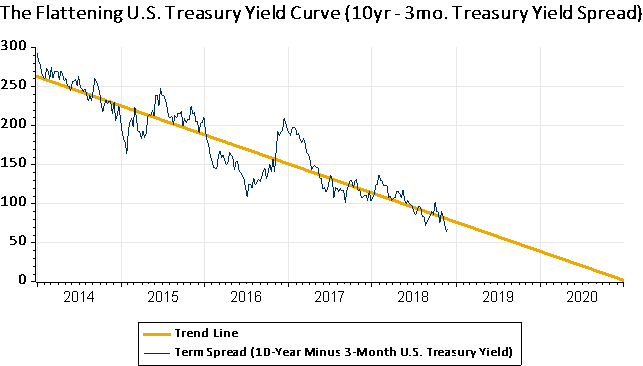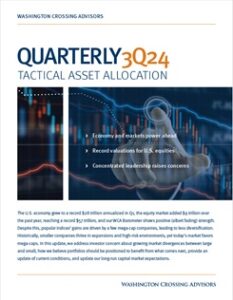Monday Morning Minute ~ December 10, 2018
Closing out short-duration tactical tilt as curve flattens.
Ahead of the Curve
We increased duration in portfolios as the long-term Treasury yields fall below 3%. Throughout the year, we pointed out that foreign conditions were weighing on the outlook. Growth expectations are lower now than in the beginning of the year, and many stock markets around the world are negative for the year. Bulls appear to be pulling in their horns amid concerns over trade, Brexit, and higher short-term interest rates. While Treasury bond yields have been rising for most of the year, that trend now appears to have been broken.
Around the World
Although
the U.S. economy continues to look good, evidenced by the unemployment rate
still near 50-year lows, the rest of the world appears to be slowing and
investors do not have much appetite for risk. The retreat from riskier assets,
like global stocks, may be contributing to a flattening of global bond yields.
The United Kingdom’s bond market has a 0.14% spread between two-year and
five-year Gilts, German Bunds offer a negative yield with five-year government
bond yields of -0.3% and two-year yields at -0.6% (a 0.3% spread), and Japan’s
two-year government bond is at -0.14% versus -0.13% for 5 year paper. There
just doesn’t seem to be any especially attractive place to safely park
short-term money across the globe’s major economies. By contrast, the United
States 2.7% two-year and five-year notes offer a relatively attractive nominal
return versus other global Treasury markets — especially when stock markets are
perceived to be risky.
We also see that the trend for spreads between short- and long-term U.S.
Treasury yields is generally lower (chart, below). Investors appear to be
willing to accept a lower return over short-term T-Bills despite the greater
uncertainty involved with holding the bonds for a longer time. In the past, an
“inverted yield curve,” which occurs when long-term Treasury yields fall below
short-term yields, has often preceded recessions. While we are not seeing
recessionary economic trends in the United States, the sharp flattening of the
curve recently, coupled with fading investor risk appetite seen in our WCA
Barometer and signs of slower global growth, are not positive signals.

Source: Bloomberg
The combination of all of these factors suggests to us that some lengthening of duration on a tactical basis is warranted until we see clearer signs that momentum has once again picked up.
For more on our long-run outlook, please read our latest Quarterly Tactical Asset Allocation Report.
Kevin Caron, CFA,
Senior Portfolio Manager
Chad Morganlander, Senior Portfolio Manager
Matthew Battipaglia, Portfolio Manager
Suzanne Ashley, Analyst
(973)
549-4168
www.washingtoncrossingadvisors.com
www.stifel.com
Disclosures
WCA Fundamental Conditions Barometer Description: We regularly assess changes in fundamental conditions to help guide near-term asset allocation decisions. The analysis incorporates approximately 30 forward-looking indicators in categories ranging from Credit and Capital Markets to U.S. Economic Conditions and Foreign Conditions. From each category of data, we create three diffusion-style sub-indices that measure the trends in the underlying data. Sustained improvement that is spread across a wide variety of observations will produce index readings above 50 (potentially favoring stocks), while readings below 50 would indicate potential deterioration (potentially favoring bonds). The WCA Fundamental Conditions Index combines the three underlying categories into a single summary measure. This measure can be thought of as a “barometer” for changes in fundamental conditions.
The information contained herein has been prepared from sources believed to be reliable but is not guaranteed by us and is not a complete summary or statement of all available data, nor is it considered an offer to buy or sell any securities referred to herein. Opinions expressed are subject to change without notice and do not take into account the particular investment objectives, financial situation, or needs of individual investors. There is no guarantee that the figures or opinions forecasted in this report will be realized or achieved. Employees of Stifel, Nicolaus & Company, Incorporated or its affiliates may, at times, release written or oral commentary, technical analysis, or trading strategies that differ from the opinions expressed within. Past performance is no guarantee of future results. Indices are unmanaged, and you cannot invest directly in an index.
Asset allocation and diversification do not ensure a profit and may not protect against loss. There are special considerations associated with international investing, including the risk of currency fluctuations and political and economic events. Investing in emerging markets may involve greater risk and volatility than investing in more developed countries. Due to their narrow focus, sector-based investments typically exhibit greater volatility. Small company stocks are typically more volatile and carry additional risks, since smaller companies generally are not as well established as larger companies. Property values can fall due to environmental, economic, or other reasons, and changes in interest rates can negatively impact the performance of real estate companies. When investing in bonds, it is important to note that as interest rates rise, bond prices will fall. High-yield bonds have greater credit risk than higher-quality bonds. The risk of loss in trading commodities and futures can be substantial. You should therefore carefully consider whether such trading is suitable for you in light of your financial condition. The high degree of leverage that is often obtainable in commodity trading can work against you as well as for you. The use of leverage can lead to large losses as well as gains.
All investments involve risk, including loss of principal, and there is no guarantee that investment objectives will be met. It is important to review your investment objectives, risk tolerance and liquidity needs before choosing an investment style or manager. Equity investments are subject generally to market, market sector, market liquidity, issuer, and investment style risks, among other factors to varying degrees. Fixed Income investments are subject to market, market liquidity, issuer, investment style, interest rate, credit quality, and call risks, among other factors to varying degrees.
This commentary often expresses opinions about the direction of market, investment sector and other trends. The opinions should not be considered predictions of future results. The information contained in this report is based on sources believed to be reliable, but is not guaranteed and not necessarily complete.
Washington Crossing Advisors LLC is a wholly owned subsidiary and affiliated SEC Registered Investment Adviser of Stifel Financial Corp (NYSE: SF).



